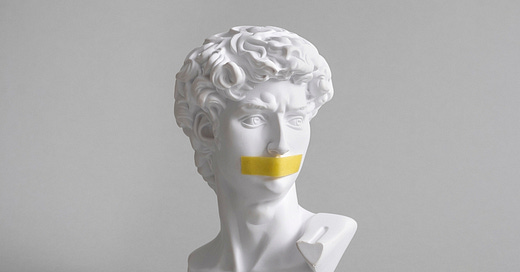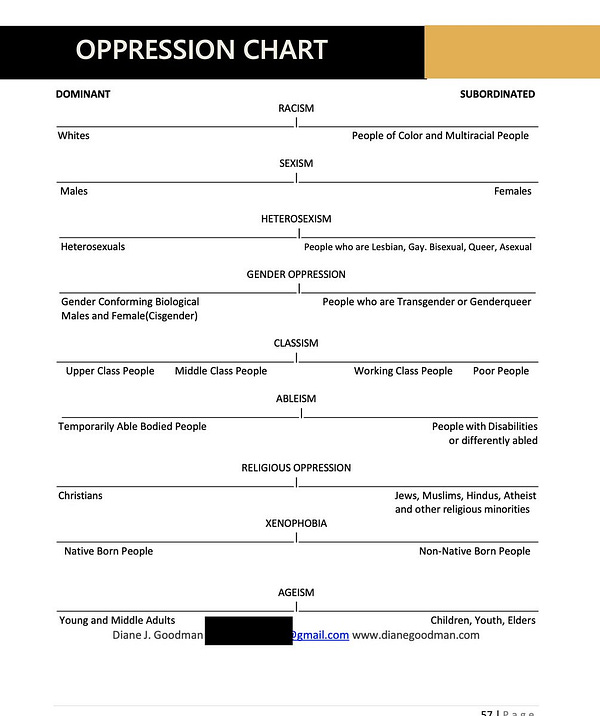E-Pluribus | February 3, 2023
Art held hostage; the problem with progressive education; and don't be too hard on 2022.
A round-up of the latest and best writing and musings on the rise of illiberalism in the public discourse:
Rikki Schlott: How Ideologues Infiltrated the Arts
A few decades ago, one was considered a Neanderthal to question the artist merit of a crucifix in a jar of urine or a depiction of the Virgin Mary created with pornohraphy and feces. Nowadays, however, pre-screening of art and artists for correct political and social views is all the rage, Rikki Schlott reports at The Free Press.
Today, many of America’s arts funders have made social justice the criteria for grants. Of the two dozen foundations I surveyed that are based in New York and California and fund the arts, fifteen either professed allegiance to DEI principles on their websites or explicitly stated they strive for racial equity via philanthropic endeavors. Of the handful of actual grant applications I could get my hands on, several required DEI statements or demographic data from applicants.
The S. Mark Taper Foundation, for instance, which doles out roughly $6 million in grants a year focused on arts, education, and social causes, has committed itself to “a continuing examination of privilege” ensuring “grantmaking that aligns with the values of diversity, equity and inclusion.” As part of their application, each organization must provide a list of their board members’ titles, length of service, and racial and ethnic profiles.
And the Ford Foundation, one of the most influential charitable organizations in the country, boasting a $16 billion endowment, has led a group of fifteen major donors in dedicating $160 million specifically to BIPOC arts organizations.
Now, DEI initiatives for the arts are spreading at the national level. On September 30, President Biden signed his Executive Order on Promoting the Arts, the Humanities, and the Museum and Library Services, with the goal of advancing “the cause of equity” through “[f]ederal support for the arts.” The administration’s policies sparked the National Endowment for the Arts’ Equity Action Plan as well as its establishment of a Racial Equity and Access Working Group.
Read it all here.
Daniel Buck: What Progressive Educators Get Wrong About Creativity
There is much to be admired in the way children think and learn, but Daniel Buck at Quillette writes that that is no reason to let them lead the way in education. The adults still need to be the adults and teachers need to teach.
. . .Primary competencies are those things that we as humans can learn almost without effort because we are primed to learn them—spoken language and motor movements for example. Thus, although it takes children time to learn to walk or to talk, such skills do not require explicit instruction.
But many things that we want our children to learn—science, written language, art, the stuff of beauty and culture—come less easily. Thus, a child cannot naturally write in iambic pentameter. Instead, poetic skills require explicit instruction and deliberate practice. “We will learn to listen and speak without schools,” Sweller observes, “but most people did not learn to read and write until the advent of mass education.” Shakespearian verse is not a natural product of the human mind.Educational progressives conflate the two competencies, observing the natural play and joyful learning that occurs in early childhood and arguing that such experiences must occur indefinitely. When in reality, according to Sweller, “biologically secondary, domain specific knowledge needs to be explicitly taught or it will not be acquired [emphasis mine].” For our students to acquire the knowledge and honed skills for creativity, it will take the structure and order of a traditional classroom. It’s not enough that children free write or mind map; they must encounter the best that has been thought and said. It is only after years of wrestling with the works of past geniuses that children can become eloquent, insightful, critical adults.
We still accept that athletic prowess and musical brilliance require drill-and-kill-type practice. The same applies to any creative work. To keep our students from rote practice or domain knowledge in favor of more “authentic” writing or performance experiences is to deprive them of the very material they need for mature artistry.
Read it all.
Michael Mazza and Shay Khatiri: Cause for Hope Amid War and Authoritarianism
There are clear reasons for concern about the direction of freedom and democracy around the world, but Michael Mazza and Shay Khatiri argue at The Dispatch there are plenty of reasons for optimism. From Iran to China to Ukraine, the oppressed are fighting back and at least in some cases, making headway.
For all the talk about autocracy’s march, the world’s worst tyrants had the foundations of their regimes shaken last year, while the worst of election deniers in America lost—and all but one conceded their losses. The liberal world’s resolute and sustained support of Ukraine—despite the costs—is another encouraging sign. That democracies are choosing the righteous, but more difficult, path belies the notion that liberalism’s best days are in the past.
[. . .]
Despite its many challenges, 2022 has perhaps been the best year for liberalism in a young century marked by setbacks. Events have yet again proven that the human heart’s desire for freedom is greater than for security and order—especially when it is the unelected and the dictatorial that define what it is to be secure. The dead and wounded in Ukraine and Iran, and the Chinese who risked their lives to challenge their oppressors, are our witnesses.
As the only creedal nation conceived in liberty, despite its many internal challenges, America is the last, best hope and foremost example from which freedom-loving peoples can draw inspiration. It is little surprise that it is to the United States that the oppressed first turn for assistance. They will take any help, but they carry English banners because that is what Americans speak.
Read the whole thing.
Around Twitter
Excerpts from a David French thread on what “supporting” an institution really means (click for the whole thread):



Nicholas Kristof joins a growing chorus of progressives who find the language wars are a losing proposition for their side:






And finally, via Christopher Rufo: no, it’s not the latest in the adventures of Keanu Reeves, but rather the “Matrix of Oppression” is brought to you by Florida State University:











